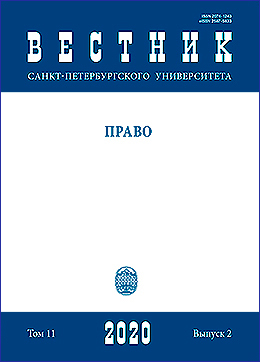Administering norms about fraud of the Criminal Code of the Russian Federation: Current state and perspectives
DOI:
https://doi.org/10.21638/spbu14.2020.208Abstract
The article is based on monitoring the administering of law, which can be found in free databases. Using the results of the research of sentences and determinations for terminating a criminal case made in 2017–2018, the authors identified the most typical problems in cases of crimes under the Articles 159–159.6 of the Criminal Code of the Russian Federation. The analysis of practices allowed the authors to conclude that the biggest difficulties are connected with understanding the terms “deceit,” “abuse of trust,” “default on obligations” and with the non-identified characteristic of material trespassing resulting from a fraudulent act under Article 159.2 of the Criminal Code of the Russian Federation. The possibility of acknowledging fraud in a case of less than 2500 rubles (with the qualifying features) as an insignificant act (part 2 of the Article 14 of the Criminal Code of the Russian Federation) is discussed in the research based on preparation for the expert determination for the Constitutional Court of the Russian Federation on the St. Petersburg State University Centre for Expert Advice. The authors analyze sentences and decisions for the termination of a criminal case based on adhering to recommendations of the Supreme Court of the Russian Federation, formulated in the Resolution of November, 30, 2017 no. 48 “About the court practice on cases of fraud, appropriation and misapplication”. As a result of the research, suggestions are made for the enhancement of legislation and introduction of amendments to the resolution of the Plenum.
Keywords:
fraud, deceit, abuse of trust, entrepreneurship, default on an obligation, fraud in getting payments, crimes’ qualification, insignificant act
Downloads
References
Downloads
Published
How to Cite
Issue
Section
License
Articles of "Vestnik of Saint Petersburg University. Law" are open access distributed under the terms of the License Agreement with Saint Petersburg State University, which permits to the authors unrestricted distribution and self-archiving free of charge.






